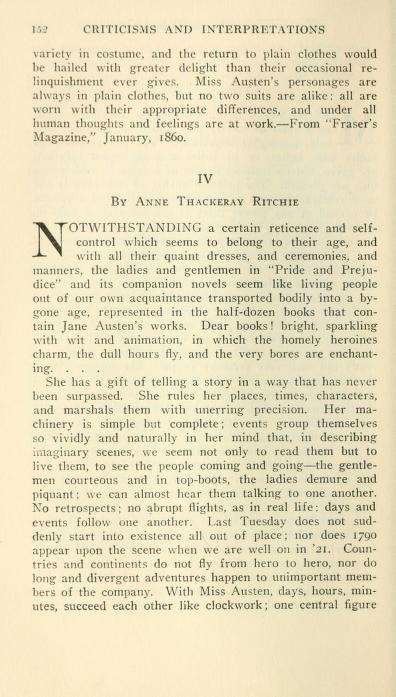 ............prev...................v?....................next
............prev...................v?....................next {{prhprp152.jpg}}
variety in costume, and the return to plain clothes would
be hailed with greater delight than their occasional re-
linquishment ever gives. Miss Austen's personages are
always in plain clothes, but no two suits are alike: all are
worn with their appropriate differences, and under all
human thoughts and feelings are at work. -- From "Fraser's
Magazine," January, 1860.
Notwithstanding a certain reticence and self-~
control which seems to belong to their age, and
with all their quaint dresses, and ceremonies, and
manners, the ladies and gentlemen in "Pride and Preju-
dice" and its companion novels seem like living people
out of our own acquaintance transported bodily into a by-
gone age, represented in the half-dozen books that con-
tain Jane Austen's works. Dear books! bright, sparkling
with wit and animation, in which the homely heroines
charm, the dull hours fly, and the very bores are enchant-
ing...
She has a gift of telling a story in a way that has never
been surpassed. She rules her places, times, characters,
and marshals them with unerring precision. Her ma-
chinery is simple but complete; events group themselves
so vividly and naturally in her mind that, in describing
imaginary scenes, we seem not only to read them but to
live them, to see the people coming and going -- the gentle-
men courteous and in top-boots, the ladies demure and
piquant; we can almost hear them talking to one another.
No retrospects; no abrupt flights, as in real life: days and
events follow one another. Last Tuesday does not sud-
denly start into existence all out of place; nor does 1790
appear upon the scene when we are well on in '21. Coun-
tries and continents do not fly from hero to hero, nor do
long and divergent adventures happen to unimportant mem-
bers of the company. With Miss Austen, days, hours, min-
utes, succeed each other like clockwork; one central figure
[152]............prev.....................next................